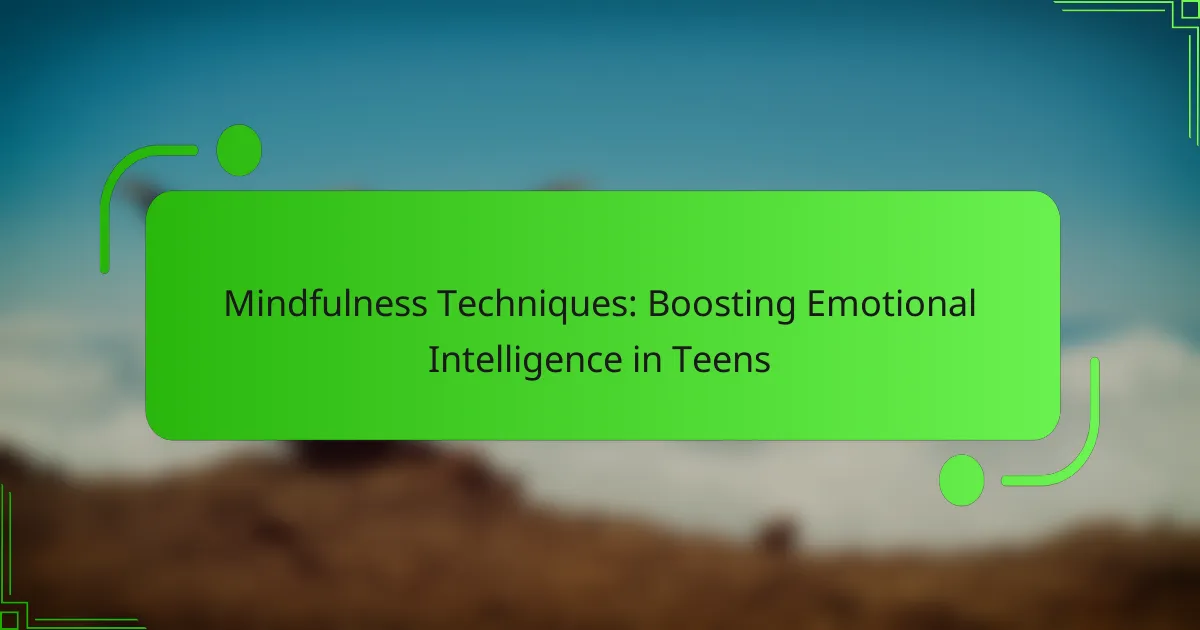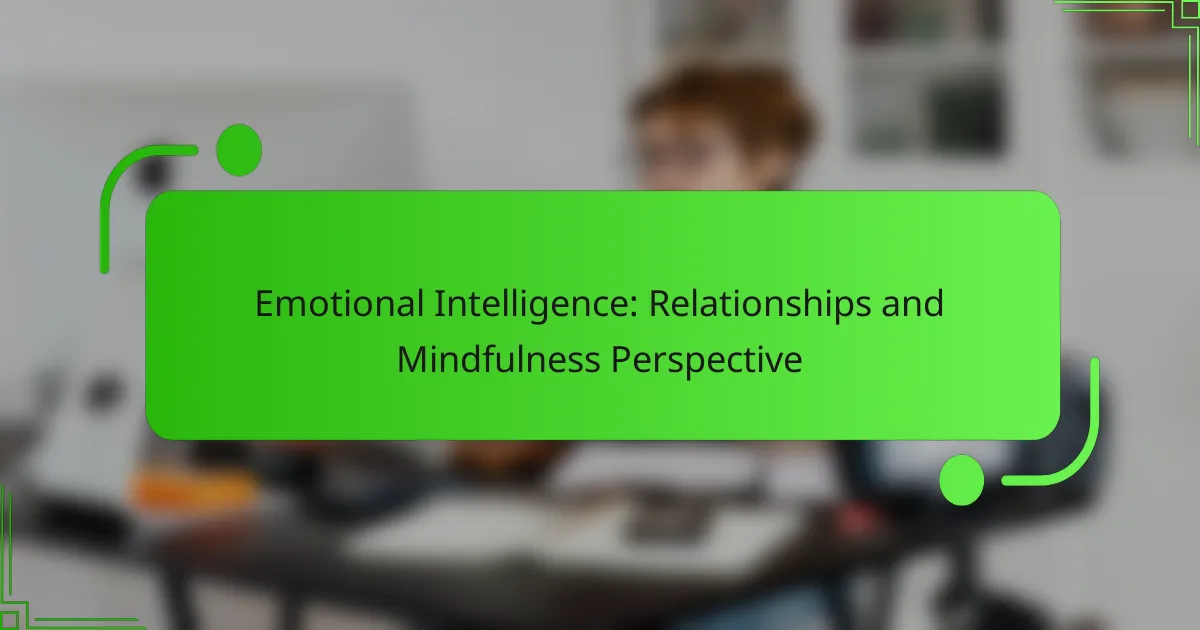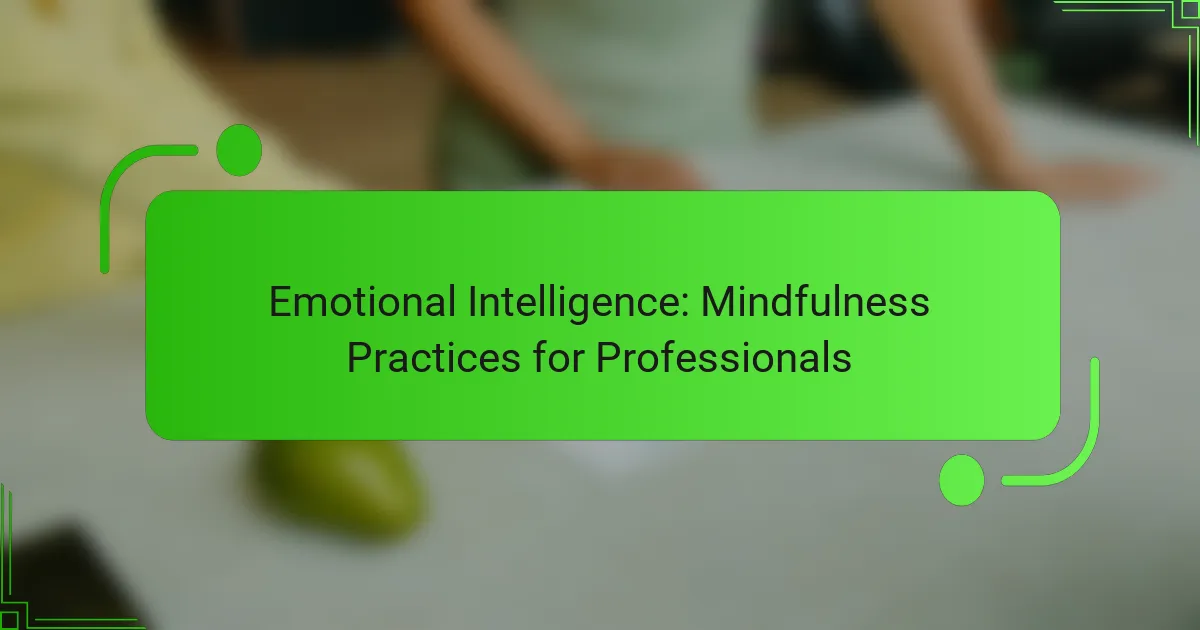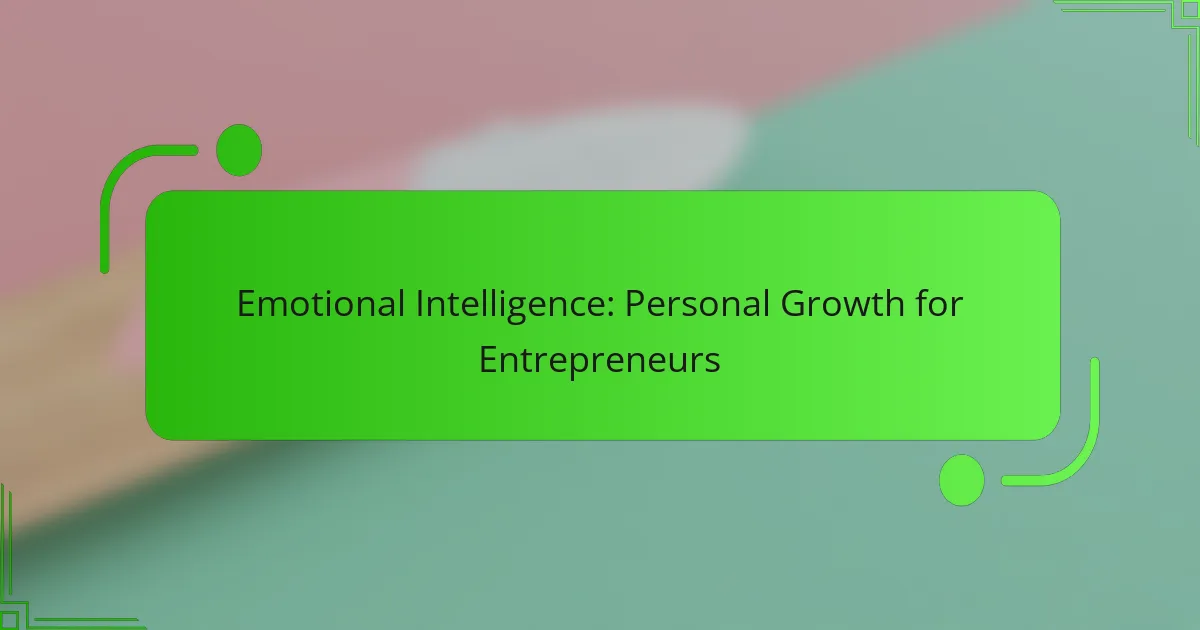Mindfulness techniques play a crucial role in boosting emotional intelligence in teens by cultivating awareness of their thoughts and feelings. Through these practices, adolescents can enhance their self-awareness and emotional regulation, leading to improved stress management and focus. Implementing mindfulness programs in schools can further support this development, fostering a nurturing environment for emotional growth and well-being.
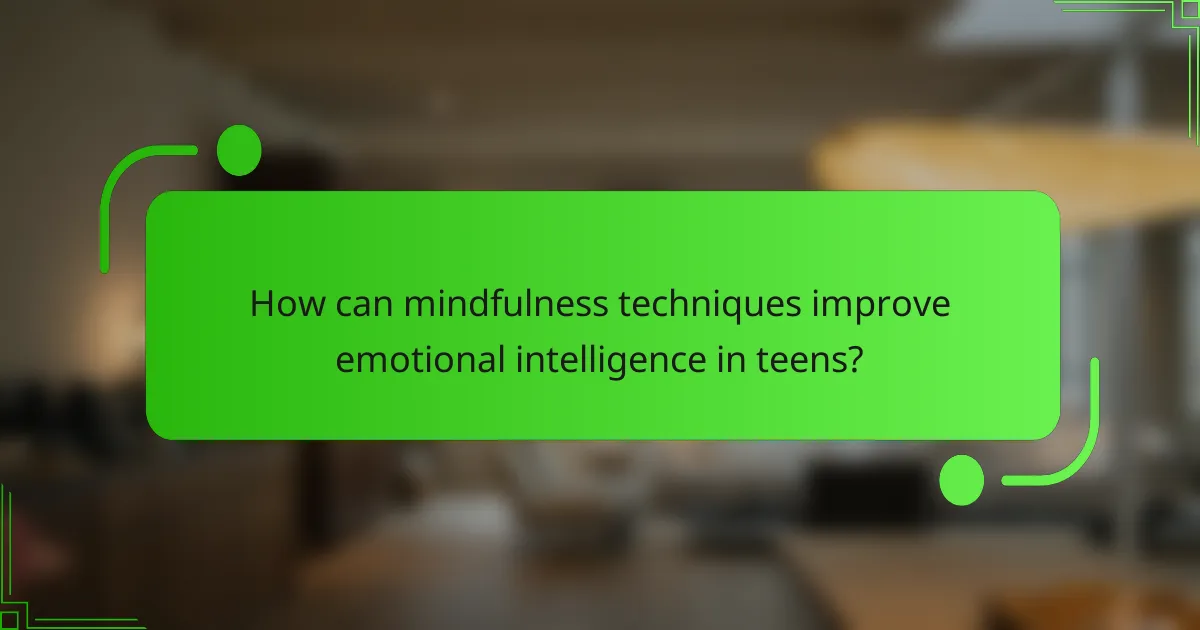
How can mindfulness techniques improve emotional intelligence in teens?
Mindfulness techniques can significantly enhance emotional intelligence in teens by fostering greater awareness of their thoughts and feelings. By practicing mindfulness, teens learn to recognize and understand their emotions, which is essential for developing emotional intelligence.
Increased self-awareness
Mindfulness promotes increased self-awareness by encouraging teens to observe their thoughts and feelings without judgment. This practice helps them identify emotional triggers and patterns in their behavior, leading to a deeper understanding of themselves.
For example, a teen may notice that they feel anxious before exams. By recognizing this pattern, they can explore coping strategies, such as mindfulness meditation, to manage their anxiety more effectively.
Enhanced empathy
Practicing mindfulness can enhance empathy by helping teens become more attuned to the emotions of others. Mindfulness encourages active listening and presence in conversations, allowing teens to connect with their peers on a deeper emotional level.
For instance, a mindful teen may notice when a friend is upset and feel compelled to offer support, fostering stronger relationships and social bonds.
Better emotional regulation
Mindfulness techniques equip teens with tools for better emotional regulation, enabling them to manage their emotions more effectively. By practicing mindfulness, they learn to pause and reflect before reacting impulsively to emotional situations.
Teens can use techniques such as deep breathing or body scans to calm themselves during stressful moments, which can lead to more thoughtful responses rather than knee-jerk reactions.
Improved social skills
Mindfulness can lead to improved social skills by enhancing communication and reducing anxiety in social situations. Teens who practice mindfulness are often more present and engaged, which helps them navigate social interactions with greater confidence.
For example, a mindful teen may find it easier to initiate conversations or resolve conflicts, leading to more positive social experiences.
Stronger resilience
Mindfulness fosters stronger resilience by teaching teens to cope with challenges and setbacks. By cultivating a mindful attitude, they learn to accept difficulties as part of life and respond with a balanced perspective.
For instance, a teen who practices mindfulness may view a poor grade as an opportunity to learn rather than a failure, helping them bounce back more effectively from disappointments.
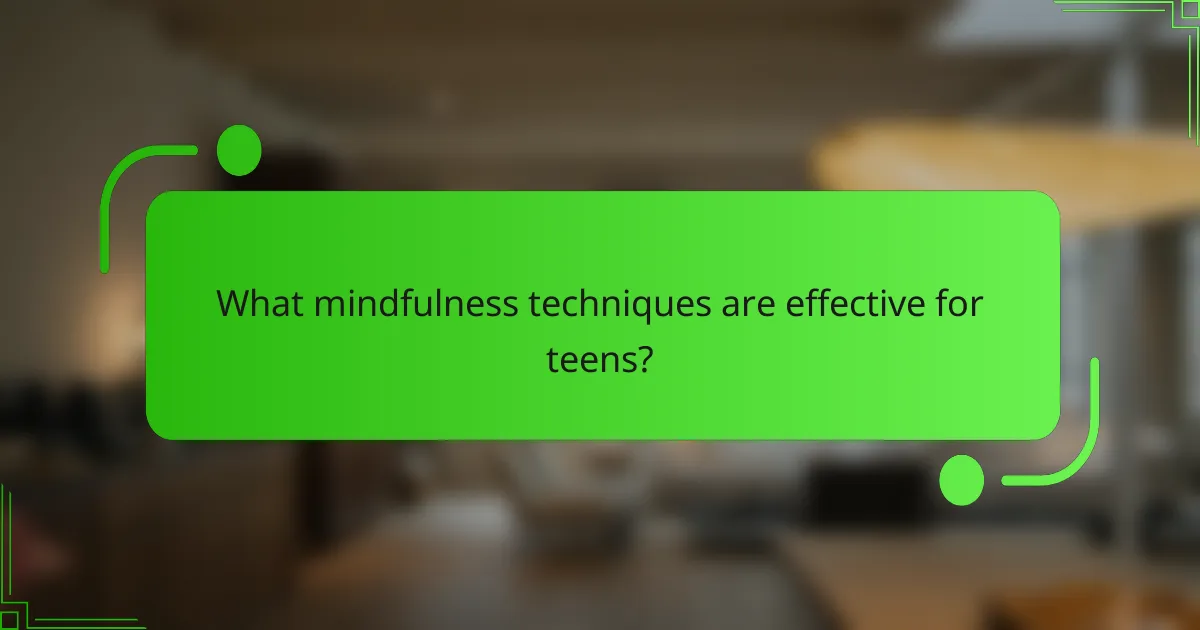
What mindfulness techniques are effective for teens?
Effective mindfulness techniques for teens include practices that enhance self-awareness and emotional regulation. These methods help adolescents manage stress, improve focus, and develop emotional intelligence.
Mindful breathing exercises
Mindful breathing exercises involve focusing on the breath to cultivate awareness and calmness. Teens can practice this by taking deep, slow breaths, inhaling through the nose and exhaling through the mouth, for a few minutes each day.
To enhance the experience, encourage teens to count their breaths or visualize the air flowing in and out. This practice can help reduce anxiety and improve concentration during stressful situations, such as exams or social interactions.
Body scan meditation
Body scan meditation helps teens connect with their physical sensations and emotions. This technique involves lying down comfortably and mentally scanning the body from head to toe, paying attention to areas of tension or discomfort.
Encourage teens to spend about 10-20 minutes on this practice, allowing them to release tension and cultivate a sense of relaxation. This can be particularly beneficial after a long day at school or during times of emotional distress.
Guided imagery
Guided imagery uses visualization to promote relaxation and emotional healing. Teens can imagine a peaceful scene, such as a beach or forest, while focusing on the details—sounds, smells, and feelings associated with that place.
This technique can be practiced alone or with the help of audio recordings. It is effective for reducing stress and enhancing positive emotions, making it a useful tool for managing anxiety before important events.
Journaling for reflection
Journaling encourages teens to express their thoughts and feelings, fostering self-reflection and emotional clarity. Setting aside time each day to write about their experiences can help them process emotions and identify patterns in their behavior.
Promote the use of prompts, such as “What made me happy today?” or “What challenges did I face?” This practice can enhance emotional intelligence by helping teens articulate their feelings and develop coping strategies.
Mindful movement practices
Mindful movement practices, such as yoga or tai chi, combine physical activity with mindfulness. These activities encourage teens to focus on their body movements and breath, promoting relaxation and emotional regulation.
Teens can start with short sessions of 15-30 minutes, either at home or in a class setting. These practices not only improve physical health but also enhance emotional resilience and self-awareness, making them valuable tools for personal development.
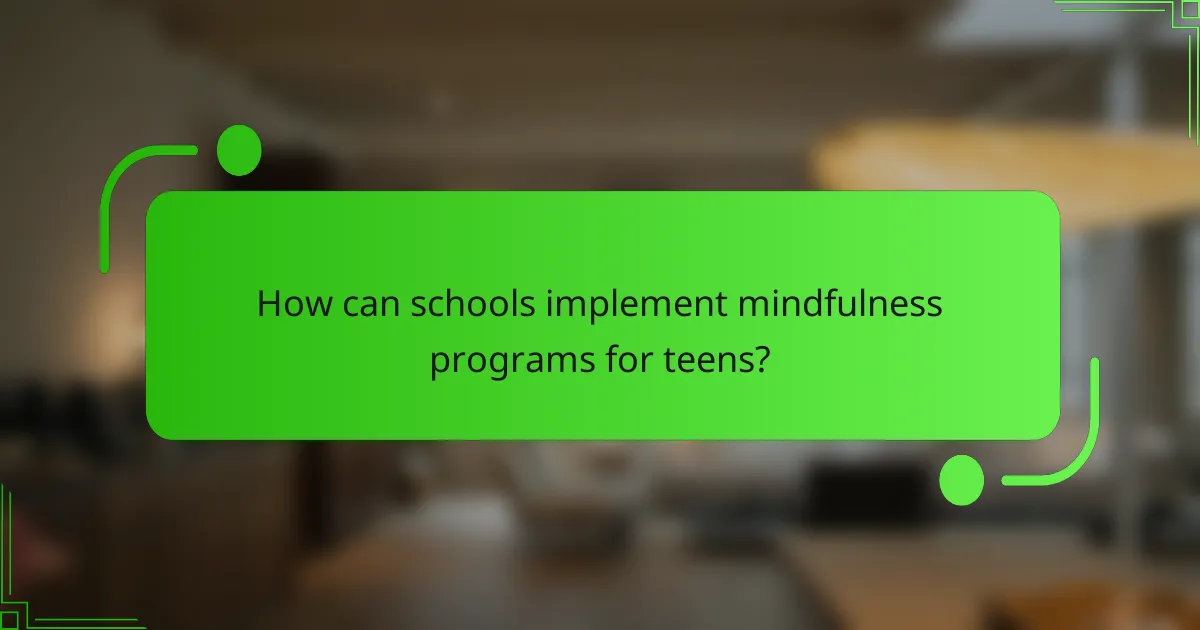
How can schools implement mindfulness programs for teens?
Schools can implement mindfulness programs for teens by integrating mindfulness practices into daily routines, training teachers to facilitate these practices, and creating supportive environments. These initiatives can enhance emotional intelligence and overall well-being among students.
Integrating mindfulness into the curriculum
Incorporating mindfulness into the curriculum can be achieved by including short mindfulness exercises at the beginning or end of classes. For example, a few minutes of focused breathing or guided meditation can help students center themselves and improve concentration.
Additionally, subjects like health education can include lessons on emotional regulation and stress management through mindfulness techniques. This integration helps students understand the practical applications of mindfulness in their daily lives.
Training teachers in mindfulness
Providing training for teachers in mindfulness practices is crucial for the successful implementation of these programs. Workshops and courses can equip educators with the skills to lead mindfulness sessions effectively and model these practices for their students.
Teachers who practice mindfulness themselves are more likely to create a supportive atmosphere, fostering emotional intelligence in their classrooms. Schools can consider collaborating with mindfulness organizations to offer professional development opportunities.
Creating mindfulness clubs
Establishing mindfulness clubs allows students to engage in mindfulness practices outside of the classroom. These clubs can meet weekly to practice meditation, share experiences, and discuss the impact of mindfulness on their lives.
Mindfulness clubs can also host events, such as mindfulness retreats or workshops, which can further promote emotional intelligence and community among students. Encouraging peer-led sessions can empower students to take ownership of their mindfulness journey.
Utilizing online resources
Schools can leverage online resources to enhance their mindfulness programs. Numerous websites and apps offer guided meditations, mindfulness exercises, and educational materials tailored for teens.
By providing access to these resources, schools can encourage students to practice mindfulness independently. Additionally, incorporating online mindfulness challenges can motivate students to engage regularly and track their progress.
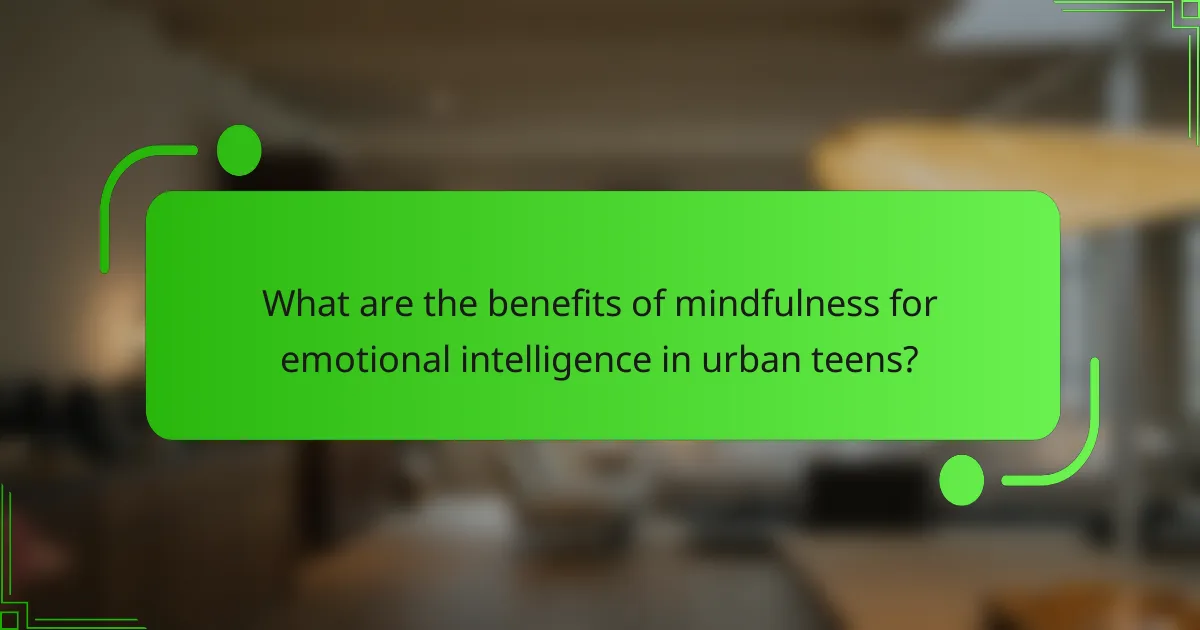
What are the benefits of mindfulness for emotional intelligence in urban teens?
Mindfulness can significantly enhance emotional intelligence in urban teens by promoting self-awareness and empathy. By practicing mindfulness techniques, teens can better manage their emotions and improve their interpersonal relationships.
Reduction of stress and anxiety
Mindfulness practices help urban teens reduce stress and anxiety by encouraging them to focus on the present moment. Techniques such as deep breathing, meditation, and mindful walking can lower cortisol levels, leading to a calmer state of mind.
Teens can incorporate mindfulness into their daily routines by setting aside just a few minutes for meditation or engaging in mindful activities like yoga. Regular practice can lead to noticeable improvements in emotional regulation and resilience against stressors common in urban environments.
To maximize the benefits, teens should aim to practice mindfulness consistently, ideally daily. They can start with short sessions of 5-10 minutes and gradually increase the duration as they become more comfortable with the techniques.
